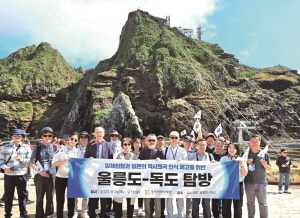
Meaningful Experiences and Ongoing Challenges in Exploring Ulleungdo Island and Dokdo Island
Until September 17th, I participated in a three-night, four-day ‘exploration of Ulleungdo Island and Dokdo Island with the aim of raising awareness about Japan’s invasion and its distortion of history. The purpose of the exploration was to visit Dokdo Island, the site of the Russo-Japanese War of 1904-1905 and the beginning of Japan’s invasion of Korean territory, in order to establish an effective strategy for recognizing and responding to Japan’s distortion of history. Nineteen participants, including Foundation Chairman Lee Youngho, seven former and current advisory committee members, five members of the team that compiled records of Japanese invasion history, and six foundation staff members, joined this exploration. It was a valuable and meaningful time to have serious discussions and dialogues on how to interpret the Japanese invasion through the keyword of our land Dokdo Island, and how to effectively convey it to the next generation, with each of them being one of Korea’s leading experts in their respective fields.
Thanks to the presence of a circular road, we had no difficulty journeying to Ulleungdo Island, where Lee Kyuwon, the prosecutor of Ulleungdo Island, marveled at the picturesque scenery about 140 years ago. Especially, the historical commentary on Ulleungdo Island and Dokdo Island provided by Hong Sung-geun, the Director of the Foundation’s exchange and promotion department, who accompanied us, was so exceptional that we wanted to document it, allowing us to fully understand the historical significance. Everyone was deeply impressed. I even recorded some of Director Hong Sung-geun’s exceptional knowledge and interpretations of Dokdo Island in video format. I later used these recordings to present to my students during a seminar titled ‘Japanology.’
Kang Cheolgu, Professor of Japanology at Pai Chai University